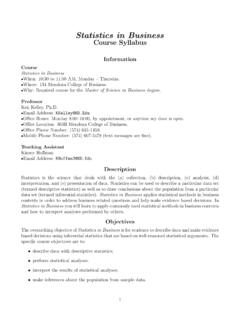Transcription of QUESTION 13 The Names of God - University of Notre Dame
1 QUESTION 13. The Names of god Now that we have considered what pertains to our cognition of god , we must proceed to a consideration of the Names of god . For each thing is named by us insofar as we know it. On this topic there are twelve questions: (1) Can God be named by us? (2) Are some of the Names said of god predicated of him substantivally? (3) Are some of the Names said of god said of Him properly, or are all the Names attributed to Him metaphorically? (4) Are the many Names said of god synonyms? (5) Are some Names said univocally of god and creatures, or are they all said equivocally? (6) Assuming that the Names are said analogously, are they said in the primary sense (per prius) of god or of creatures? (7). Are some Names said of god from a given point in time? (8) Is the name God' the name of a nature or of an operation? (9) Is the name God' a shareable name ? (10) Is the name God' taken univocally or equivocally in signifying God through nature, according to participation, and according to opinion?
2 (11). Is the name He Who Is' ( Qui est') an especially proper name of god ? (12) Can affirmative propositions be formulated about God? Article 1. Does any name befit God? It seems that no name befits God: Objection 1: In De Divinis Nominibus, chap. 1, Dionysius says, There is no name for Him, or even a conjecture. And Proverbs 30:4 says: What is His name , and what is the name of His son, if you know? . Objection 2: Every name is predicated either abstractly (in abstracto) or concretely (in concreto). But Names that signify concretely do not belong to God because He is simple; and Names that signify abstractly do not belong to Him because they do not signify anything that is a complete subsistent being. Therefore, no name can be said of god . Objection 3: Names signify a substance with a quality, whereas verbs and participles signify temporally, and pronouns signify either demonstratively or relatively. But none of these belong to God. For He exists without qualities and, indeed, without any accident; and He exists without time; and He cannot be sensed, so that He might be pointed at; nor can He be signified relatively, since relative [pronouns] refer back to antecedents that are Names or participles or demonstrative pronouns.
3 Therefore, God cannot be named by us in any way. But contrary to this: Exodus 15:3 says, The Lord is as a man of war, Almighty is His name .. I respond: According to the Philosopher, spoken words are signs of acts of intellective understanding (signa intellectuum), and acts of intellective understanding are likenesses of things (rerum similitudines). And so it is clear that spoken words are used to signify things by the mediation of the intellect's conception (mediante conceptione intellectus). Therefore, insofar as we can have a cognition of a thing through an act of intellective understanding, it can be named by us. Now it was shown above (q. 12, a. 12) that in this life we cannot see God through His essence, but that instead we have cognition of Him from creatures (a) in His status as a principle, (b) through the way of preeminence, and (c) through the way of negation (secundum habitudinem principii et per modum excellentiae et remotionis). Therefore, God can be named by us from creatures, but not in such a way that the name signifying Him expresses what the divine essence is , not in the way that the name man' expresses by its signification the essence of man as such.
4 For man' signifies the definition of a man, thus making clear his essence, since the conception (ratio) that the name signifies is the definition. Part 1, QUESTION 13 89. Reply to objection 1: The reason that God is said not to have a name , or to be beyond naming, is that His essence is beyond that which we understand intellectively about God and which we signify by spoken words. Reply to objection 2: Since we come to the cognition of god from creatures and on this basis name Him, the Names that we attribute to God signify in a mode that belongs to material creatures, the cognition of which is connatural to us, as was explained above (q. 12, a. 4). Among creatures of this sort, the ones that are complete and subsistent are composite, whereas in their case form is not a complete subsistent thing, but is instead that by which something is such-and-such. Because of this, all the Names that we impose to signify something complete (completum) and subsistent signify concretely (in concretione), since they belong to composite things.
5 On the other hand, the Names that are imposed to signify simple forms signify something not as subsistent but as that by which something is such-and-such; for instance, whiteness' signifies that by which something is white. Therefore, since God is both simple and subsistent, we attribute to him both (a) abstract Names , in order to signify His simplicity, and (b) concrete Names , in order to signify His subsistence and completeness (perfectionem), even though both sorts of Names fall short of His mode of being just as, in this life, our intellect does not know Him as He is. Reply to objection 3: To signify a substance with a quality is to signify a suppositum with a determinate nature or form in which it subsists. Hence, since, as has just been explained, some Names are said of god concretely (in concretione) in order to signify His subsistence and completeness, it follows that some Names that signify a substance with a quality are said of god . On the other hand, verbs and participles that co-signify a time are said of Him because eternity includes all of time.
6 For just as we are to able to apprehend and signify simple subsistent things only in the mode of composite things, so we can understand and verbally express eternity only in the mode of temporal things. This is because our intellective understanding is connatural with composite and temporal things. Pronouns are said of god insofar as they refer demonstratively to that which is understood, not to that which is sensed. For to the extent that something is understood by us, it falls under demonstrative reference. And just as it is in this way that Names and participles and demonstrative pronouns are said of god , so too it is in this way that God can be signified by relative pronouns. Article 2. Is any name said of god substantivally? It seems that no name is said of god substantivally (substantialiter): Objection 1: Damascene says, It must be the case that each of the things said of god does not signify what He is according to His substance, but rather expresses either what He is not, or some relation, or something that follows from His nature or operation.
7 Objection 2: In De Divinis Nominibus, chap. 1, Dionysius says, You will find all the hymns of the holy theologians dividing the Names of god in a clear and praiseworthy manner according to the beneficent processions of the supreme deity. His meaning is that the Names that the holy doctors use in praise of god are distinguished in accord with what proceeds from God Himself (secundum processus ipsius Dei). But that which signifies what proceeds from a given thing does not signify anything Part 1, QUESTION 13 90. pertaining to its essence. Therefore, the Names said of god are not said of Him substantivally. Objection 3: A thing is named by us insofar as it is understood. But in this life we cannot understand God according to His substance. Therefore, neither can any name imposed by us be said of god according to His substance. But contrary to this: In De Trinitate 6 Augustine says, But in the case of god , to be is the same as to be powerful or to be wise or whatever else you might say of that simplicity, by which His substance is signified.
8 Therefore, all Names of this sort signify the divine substance. I respond: As regards those Names which are said of god negatively or which signify His relation to creatures, it is clear that they do not signify His substance in any way. Rather, they signify either (a). the denial of something of Him or (b) His relation to another (or, better, another's relation to Him). However, as regards the Names that are said of god affirmatively and non-relationally (absolute). such as good', wise', and others of this sort there are differing opinions. Some have claimed that even though all these Names are said affirmatively of god , we nonetheless find that they deny something of god rather than posit something in Him. Thus, they claim that when we say that God is living, what we signify is that God does not exist in the way that non-living things do; and all the other cases should be dealt with in a similar way. This is the position of Rabbi Moses. Others claim that these Names are imposed to signify a relation of god to created things.
9 For instance, when we say that God is good, the meaning is that God is a cause of goodness in things. And the same line of reasoning holds in the other cases. But both of these positions seem wrong, and for three reasons: First, neither of these positions can explain why certain Names are said of god rather than others. For example, He is a cause of bodies in the same way that He is a cause of good things. So if, when God is called good, nothing is signified other than that He is a cause of good things, one could likewise claim that God is a body because He is a cause of bodies. Again, in saying that He is a body, one would be denying that He is merely a being in potentiality, like primary matter. Second, it follows that all the Names said of god would be said of Him in a derived sense (per posterius), in the way that healthy' is said in a derived sense of medicine by virtue of the fact that it signifies merely that medicine is a cause of health in an animal, which is called healthy' in the primary sense (per prius).
10 Third, the positions in QUESTION are contrary to the intention of those who speak about God. For when they say that God is living, they mean something other than that He is a cause of our life or that He differs from non-living bodies. And so we must respond in another way by claiming that (a) Names of this sort do indeed signify the divine substance and are predicated of god substantivally, but that (b) they fall short in their representation of Him (deficiunt a repraesentatione ipsius). This is clear as follows: Names signify God according to the way in which our intellect has cognition of Him. But when our intellect has a cognition of god from creatures, it has a cognition of Him in accord with the way in which creatures represent Him. Now it was shown above (q. 4, a. 2) that God, as a being who is perfect absolutely speaking and in all respects, contains within Himself all the perfections of creatures. Hence, each creature represents Him, and is similar to Him, to the extent that it has some perfection not in the sense that it represents Him as something of the same species or genus, but rather in the sense that it represents Him as a supreme principle whose effects fall short of His form, but to whom His effects nonetheless bear some sort of similarity in the way that the forms of lower bodies represent the power of the sun.



















